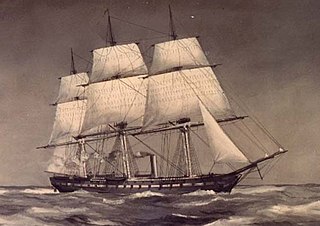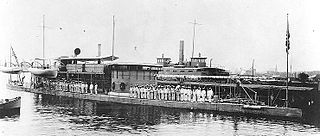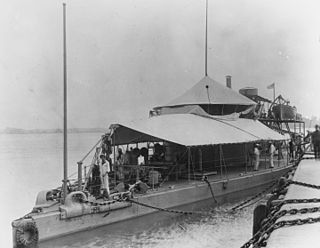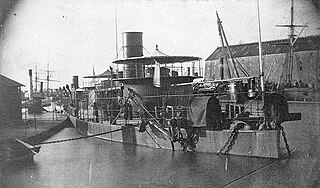USS Agamenticus was one of four Miantonomoh-class monitors built for the United States Navy during the American Civil War. Commissioned as the war was ending in May 1865, the ironclad saw no combat and was decommissioned in September and placed in reserve. The ship was reactivated in 1870, having been renamed Terror the previous year, and was assigned to the North Atlantic Fleet where she served in the Caribbean Sea. The monitor was decommissioned again in 1872 and was sold for scrap two years later. The Navy Department evaded the Congressional refusal to order new ships by claiming that the Civil War-era ship was being repaired while building a new monitor of the same name.
The first USS Shreveport (PG-131/PF-23) was a Tacoma-class frigate of the United States Navy.

CSS Columbia was an ironclad steamer ram in the Confederate States Navy and later in the United States Navy.

USS Wabash was a steam screw frigate of the United States Navy that served during the American Civil War. She was based on the same plans as Colorado. Post-war she continued to serve her country in European operations and eventually served as a barracks ship in Boston, Massachusetts, and was sold in 1912.
The first USS Mariveles was a gunboat in the United States Navy during the Spanish–American War.

USS Tonawanda was one of four Miantonomoh-class monitors built for the United States Navy during the American Civil War of 1861–1865. Commissioned in 1865 after the war ended in May, the ship was decommissioned at the end of the year, but was reactivated to serve as a training ship at the United States Naval Academy in 1866. She was renamed Amphitrite in 1869 and was decommissioned again in 1872. The monitor was sold for scrap the following year. The Navy Department evaded the Congressional refusal to order new ships by claiming that the Civil War-era ship was being repaired while building a new monitor of the same name.

Originally named USS Tippecanoe, after the river in Indiana, USS Wyandotte was a single-turreted Canonicus-class monitor built for the Union Navy during the American Civil War. Completed after the end of the war, Wyandotte was laid up until 1876, although she received her new name in 1869. The ship was commissioned in 1876 and assigned to the North Atlantic Squadron for the next three years. She became a receiving ship in 1879 until she was placed in reserve again in 1885. Wyandotte was on militia duty when the Spanish–American War began and she was recommissioned in 1898 to defend Boston, Massachusetts from any Spanish raiders. The ship was decommissioned after the end of the war and sold for scrap in 1899.

USS Ajax, originally named USS Manayunk after a town in Pennsylvania, was a single-turreted Canonicus-class monitor built for the Union Navy during the American Civil War. Completed after the end of the war, Ajax was laid up until 1871, although she received her new name in 1869. The ship was briefly activated in 1871, before a much longer commission began in 1874–1875. She was assigned to the North Atlantic Squadron during this time. Ajax was again placed in reserve in 1891. The ship was on militia duty when the Spanish–American War began and she was recommissioned in 1898, to defend Baltimore, Maryland, although she was decommissioned later in the year before the necessary refit could be completed. Ajax was sold for scrap in 1899.

USS LSM-397 was a 520-ton (empty) Landing Ship Medium (LSM) of the United States Navy. Built at Charleston Navy Yard, South Carolina, and commissioned in July 1945, she served with the U.S. Atlantic Fleet for her entire Navy career, initially with the Amphibious Force. She was reassigned to the Service Force in May 1954. LSM-397 was decommissioned in February 1958, and was sold in May 1958.

The Miantonomoh class consisted of four monitors built for the Union Navy during the U.S. Civil War, but only one ship was completed early enough to participate in the war. They were broken up in 1874–1875.

The Canonicus-class monitor was a class of nine monitors built for the Union Navy during the American Civil War. They saw service in the Civil War and the Spanish–American War, although two of them were never commissioned.

The first USS Emma was a steamer captured by the Union Navy during the American Civil War. She was used by the Union Navy as a picket and patrol vessel on Confederate waterways.

USS Chattanooga was constructed during the final years of the American Civil War, but was not commissioned because the war was winding down in the Union’s favor. She was eventually placed into reserve until she was holed by ice in 1871.

SS West Mahomet was a steel–hulled cargo ship which saw service as an auxiliary with the U.S. Navy in 1918–19.

SS West Humhaw was a steel–hulled cargo ship built in 1918 as part of the United States Shipping Board's emergency World War I shipbuilding program.
This page is based on this
Wikipedia article Text is available under the
CC BY-SA 4.0 license; additional terms may apply.
Images, videos and audio are available under their respective licenses.











